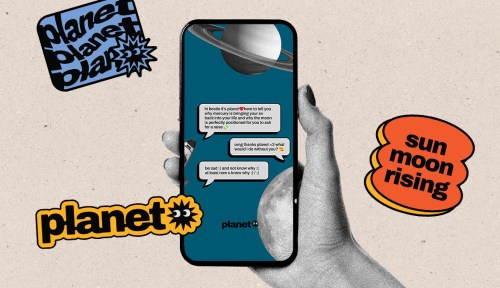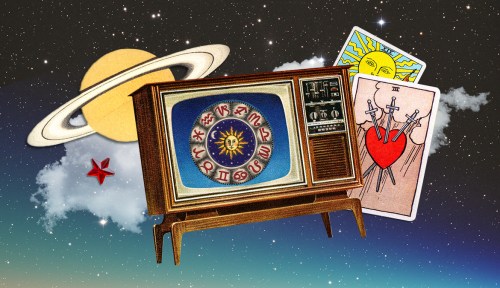Even to a self-proclaimed astrology buff like me, astrology content can sometimes feel a little out there. Horoscopes, for instance, might tell you that this month could be a lucky one for your career or relationships without much context as to why. On the flip side, you might get so much context that you get lost in the astro sauce. (Conjunction, who? Sextile, what?) And even if you do get a clear understanding of the energies at play, you still might ask, “Well, what do I do with this information?”
Experts in This Article
It’s that question that Nechama Muchnik and Rinny Shim, co-founders of a new astrology text service called Planet, are hoping to solve. The simple daily texts, featuring actionable takeaways from the cosmic forecast, aim to bring astrology back down to, well, Earth.
How does the Planet daily astrology text work?
When you sign up for Planet—by texting “Planet” to 646-859-0376—you have the opportunity to receive an astrological forecast every day or, if that sounds like too many texts, three times a week (on Sundays, Tuesdays, and Thursdays). Each forecast arrives as a single text that’s no longer than a brief paragraph or so, sometime between 7 and 8 p.m. EDT with intel for the following day or couple of days, depending on the forecast cadence you choose.
Unlike a horoscope, these forecasts aren’t tied to your birth chart or sun sign. That means you won’t need to share any birth info to receive them. Instead, they’re based on the cosmic landscape of each day, interpreting the astrological phenomena that affect everyone (think: Mercury retrograde can make communication wonky for us all)—much like a weather app interprets the weather forecast.
That’s not to say the Planet astrology texts are impersonal. In fact, Muchnik and Shim created it as a text service rather than an app to make the experience as engaging and personable as possible. “Just as you might text a friend or get into a back-and-forth with an astrologer during a reading, you can text Planet back with follow-ups, too,” says Muchnik. “Right now, our policy is that we’ll respond within 24 to 48 hours.” (The texting program operates through a secure third-party server, which allows the brand to mitigate privacy concerns should you choose to text back with questions.)
Where do Planet’s astrological insights come from?
To translate the astrology of each day and craft the daily forecasts, Muchnik and Shim work with Planet’s chief astrologer Siobhan Lumsden. She first assesses the astrological landscape for two weeks at a time, considering the sign of the sun (which changes monthly) and the moon (which changes every two and a half days), as well as any key transits, like whether a particular planet recently stationed retrograde or direct, whether we’re in eclipse season, and so on. Then, she distills that intel into simple advice for making the most of each day.
“Yes, the name ‘Planet’ comes from the planets in the sky, but it’s also a play on words for ‘plan it’ in that the texts are meant to help you actually plan your day.” —Nechama Muchnik, co-founder, Planet
“We really try to break it down into actionable steps,” says Lumsden. After all, the name “Planet” isn’t just in reference to the planets in the sky, says Muchnik: “It’s a play on words for ‘plan it’, in that the texts are meant to help you actually plan your day.” For instance, says Lumsden, if the moon (which is associated with feelings and emotions) is in Aries (a fire sign known for action and initiation), then what should or shouldn’t you do that day?
Naturally, there are a variety of planetary transits happening at any moment in time, which is also where Lumsden’s expertise as an astrologer comes into play. “You have to keep in mind that the energy of some transits will contradict that of others on a given day,” she says. “And at that point, it comes down to, ‘What is most significant for this day?’”
With these insights from Lumsden in hand, Muchnik and Shim then create Planet’s streamlined text copy for each day, which reads purposefully casual, as if it’s coming from your fun astrologically informed friend. You know, the one who’s always asking you about your “big three” and dropping full moons and Mercury retrogrades into everyday conversation.
That’s the role that both Muchnik and Shim play in their respective friend groups, which is how they initially bonded while working together on the creative production for an advertising campaign about a year ago. “We found ourselves trying to guess our entire production team’s zodiac signs, and this bled into every other social interaction that followed,” says Shim. It wasn’t long until their co-workers were coming to them for actual astrological advice, and they realized there was an opportunity to make astrology content more actionable.
How are Planet’s forecasts designed to include useful advice for everyone?
In order to ensure that every Planet astrology text is universally applicable, Muchnik and Shim include a few takeaways in each. “For example, if the astrological forecast points to it being a great day to give a presentation, maybe it’s also a great day to go on a first date or, if you’re in a relationship, to make a bold move in the bedroom,” says Muchnik.
In the future, there are also plans to customize the texts based on demographics like age, relationship status, and location, with the goal of sharing even more actionable recommendations. “For example, there was a moon in Libra a couple weeks ago, and we had recommended that people in New York City go check out the Alex Katz exhibit at the Guggenheim,” says Muchnik, “given its very Libran themes of gathering and relationships.”
For now, though, whenever a Planet forecast includes a demographic-specific recommendation like the above, the text will also share one or more additional recommendations applicable to folks in other demographics. The idea is to offer up just enough interpretations of the cosmic energy at hand that everyone can find a clear takeaway (but not so many that it veers toward overwhelming).
“What we’re most excited about is turning astrology from something that you consume into something that you can actually incorporate into the way you lead your life on a day-to-day basis,” says Muchnik.
Sign Up for Our Daily Newsletter
Get all the latest in wellness, trends, food, fitness, beauty, and more delivered right to your inbox.
Got it, you've been added to our email list.








